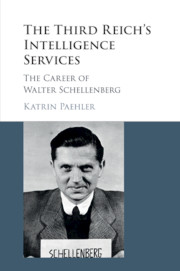Book contents
- Frontmatter
- Dedication
- Contents
- List of Figures
- Acknowledgments
- Archives
- Introduction
- 1 Gaining a Foothold
- 2 Rising Star
- 3 Intelligence Man
- 4 Office VI and Its Forerunner
- 5 Competing Visions: Office VI and the Abwehr
- 6 Doing Intelligence: Italy as an Example
- 7 Alternative Universes: Office VI and the Auswärtige Amt
- 8 Schellenberg, Himmler, and the Quest for “Peace”
- 9 Postwar
- 10 Concluding Thoughts
- Appendix
- Glossary
- Index
4 - Office VI and Its Forerunner
Published online by Cambridge University Press: 31 March 2017
- Frontmatter
- Dedication
- Contents
- List of Figures
- Acknowledgments
- Archives
- Introduction
- 1 Gaining a Foothold
- 2 Rising Star
- 3 Intelligence Man
- 4 Office VI and Its Forerunner
- 5 Competing Visions: Office VI and the Abwehr
- 6 Doing Intelligence: Italy as an Example
- 7 Alternative Universes: Office VI and the Auswärtige Amt
- 8 Schellenberg, Himmler, and the Quest for “Peace”
- 9 Postwar
- 10 Concluding Thoughts
- Appendix
- Glossary
- Index
Summary
You will recognize from this that even Office VI fulfills its responsibility and duty, and that it is surely worth the support by other offices and departments, if this is possible in the first place.
Speech prepared for Heinz Jost, Amtschef Office VI 12 June 1941On September 19, 1939 the office heads of the newly established RSHA convened for a meeting during which Heydrich took aim at the political foreign intelligence service, Office VI. Dr. Albert Filbert stood in for Heinz Jost, who was still on duty in Poland. In front of his peers and “[i]n unequivocal form,” Heydrich told Filbert that “the foreign reports were poor and had to be reorganized substantially. In their existing form they were a poor compilation of newspaper and radio news of foreign senders.”Heydrich impatiently requested the “commencement of the work, and [he] wishes [to receive] only those reports that are acquired through direct intelligence work.” Jost and his foreign intelligence service had been put on notice.
Under Jost's leadership Office VI was engaged in an uphill battle. During the years that Schellenberg worked on remaking the Gestapo's counterintelligence department into an intelligence service with a broadened mandate and new methods, Office VI strove to establish itself as a respected foreign intelligence entity. Jost's office attempted to transcend its many conceptual problems – many of them related to its pedigree as part of the SS – and to forge a new identity in an environment defined by intense internal competition and the beginning of the Second World War. For Jost, this process ended in failure; in July 1941, Schellenberg took over the office's leadership. The following pages describe the history of Office VI and its predecessor and discuss their place and role in Nazi Germany's foreign intelligence universe. How did Office VI and its forerunner conceptualize, execute, and evaluate political foreign intelligence?
Early SD foreign intelligence efforts were associated with Heinz Jost. Office VI of the RSHA had its origins in Office III of the Sicherheitshauptamt, SD Main Office, created in early 1935. The SD Main Office found itself in conflict with the police on the one hand and the Abwehr, Germany's military intelligence, service on the other: a party organization rooted in the SS, it intended to take on policing and intelligence functions in the state.
- Type
- Chapter
- Information
- The Third Reich's Intelligence ServicesThe Career of Walter Schellenberg, pp. 105 - 146Publisher: Cambridge University PressPrint publication year: 2017

